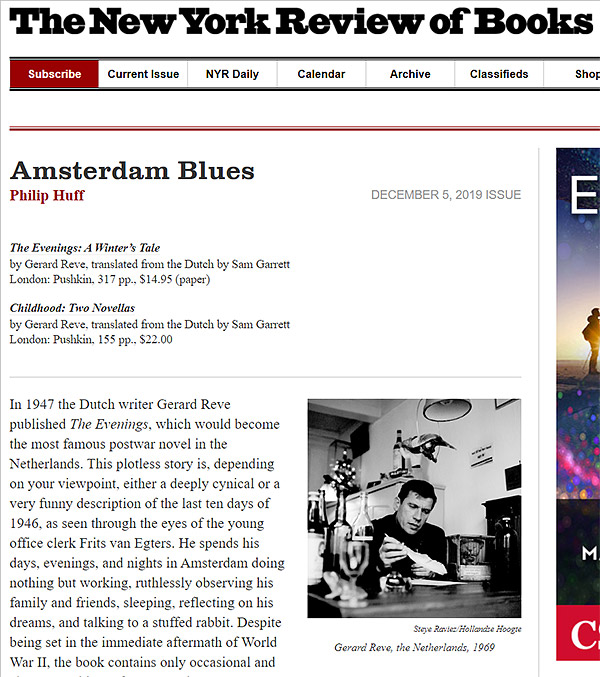

The New York Review of Books: Amsterdam Blues. Philip Huff over Gerard Reve
31 december 2019
In het prestigieuze The New York Review of Books begin december een artikel, Amsterdam Blues, van (de Nederlandse auteur) Philip Huff over Gerard Reve. Aanleiding zijn de vertalingen in de afgelopen jaren door Sam Garret van 'De Avonden (The Evenings: A Winter's Tale)' en 'De Ondergang van de Familie Boslowits / Werther Nieland (Childhood: Two Novellas)'.
Het is een mooi artikel geworden waarin Huff een korte levensschets van Reve geeft en zich verder vooral concentreert op het naoorlogse Nederland waar de oorlogsperiode snel en resoluut werd afgesloten en de focus grotendeels kwam te liggen op de wederopbouw. Dat niet iedereen daar even gelukkig van werd moge inmiddels wel duidelijk zijn. Reve zelf en zijn vroege werk zijn daar bij uitstek representanten van.
Het heeft heel lang geduurd maar Reve's internationale doorbraak begint langzamerhand vorm te krijgen. En Huff draagt daar een mooi steentje aan bij.

Op de website van The New York Review of Books is alleen het begin van het artikel te lezen (rest alleen voor abonnee's).
Een kopie van de papieren versie kunt u lezen door onderstaande links aan te klikken:
Enkele fragmenten:
While Protestant language is spare and simple, Reve's language is extravagant and rich, like a cardinal's robes.
The narrative structure of 'The Fall of the Boslowits Family' is deftly crafted and can be seen as both a counterpoint to and rehearsel for the narrative structure of 'The Evenings'. A rehearsel, because in both stories the war is never explicitly referenced, but instead carved out by silence. And a counterpoint, because unlike the narrator of 'The Evenings', the narrator of the Boslowits Family story is too young to understand everything going on around him or to confront the troubles of his times head on.
Over 'The Evenings':
Frits is in exile from himself, in a sense, because of the alienating conditions of society. Droves of young literary readers recognized themselves in Reve's "Hero" (..).
Frits van Egters bears more than a passing resemblance to the novel's author: Reve was a reserved, insecure and detached adolescent with psychiatric problems who spoke in a baroque, "bookish" language that was very much his own. (..) He is young, healthy and employed. Yet he is not interested in his country's reconstruction. Instead he is obsessed with decay and ugliness, with pimples and hair loss, pettiness and disgust (..)
Frits and his friends are bored because there is nothing to do. Talking to one another is one of the few outlets they have. Here is Frits talking about his quarreling parents to his friends: "'It gets on my nerves,' said Frits. 'I'm only waiting for them to hang themselves or beat each other to dead. Or set the house on fire. For God's sake, let it be that. So why hasn't it happened yet? But let us not despair. All things come to those who wait.'"
As Reve worked on his book during the dark winter days of 1946, he typed an addendum to his list: the initial scale of his project was too modest, he needed more words to capture his arrested times in prose, and to create his own space. With 'The Evenings', the young Reve inhabited the deeply funny, bleak, and begrudgingly sympathetic worldview of Frits van Egters. In doing so, he proved to be one of the Netherlands's finest postwar writers.
Website Philip Huff
Met dank aan Bert Boelaars
 |
| home | nieuwsarchief | bibliotheek | colofon |